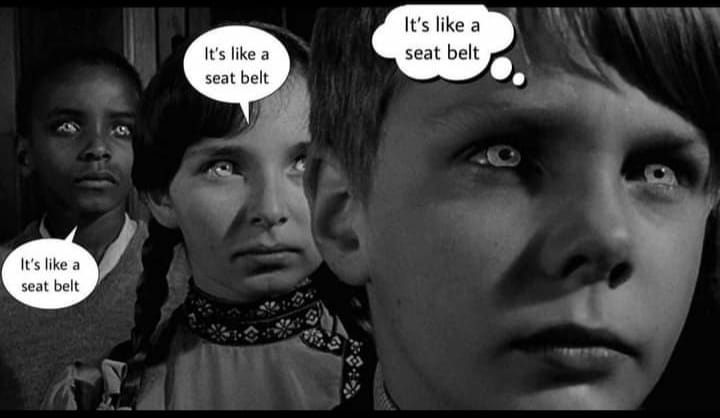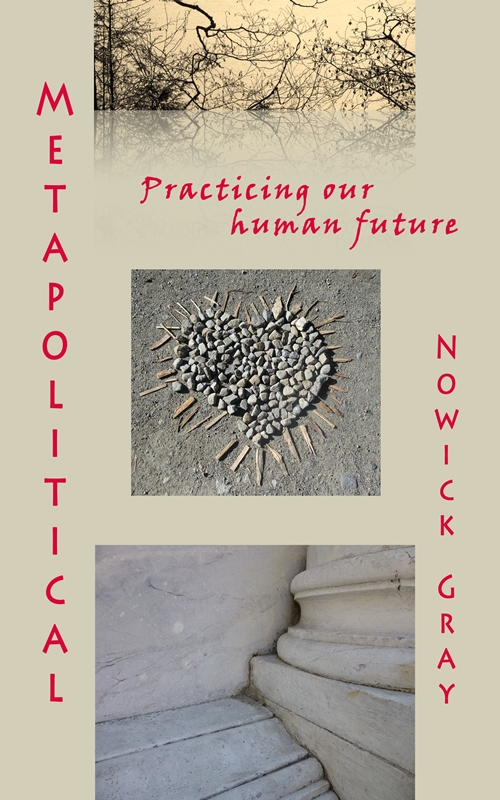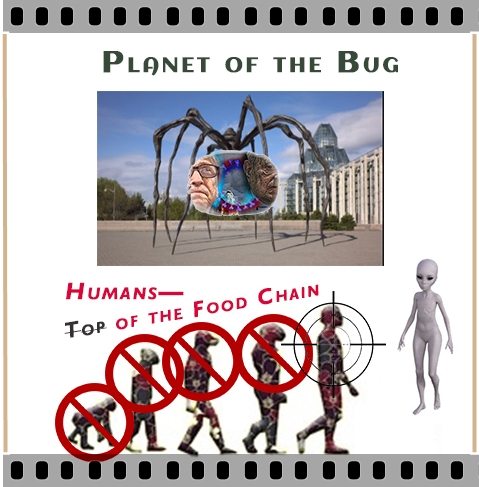Planet of the Bug
by Nowick Gray
 HyperCoup Revealed
HyperCoup Revealed
The coup reveals all:
multicoup of everything
nothing sacred left.
How many percent
of this or that will it take
to wake the sleeping
dragon, justice, now?
The yearning to live again
to say this is ours.
What’s reality?
Not what the script readers say.
What you discover.
If the “vaccines” work
what’s going on? Deaths going up,
childhood strokes… Lockout.
What will you create
in gathering with others?
Do not die alone.
Name the abusers.
Remember Nature’s freedom.
Protect the future.
Problem > Reaction > Solution
By now many are familiar with the practice if not the theory known as “Problem–Reaction–Solution.” Inspired by the philosopher Hegel and popularized by David Icke, we know it as the Plandemic: a fake crisis to justify a total makeover of global society. Over a decade in advance, Icke’s prophetic synopsis nailed the modus operandi we recognize today:
‘Step 1: The duplicitous bastards in question either take advantage of a pre-existing problem by making it more atrocious (or even worse, they create an artificial problem out of whole cloth).
‘Step 2: They then present to the public (through their corporate media) the version of the problem they want so as to elicit a particular response from the population (“What are they going to do about it?!)
‘Step 3: The Establishment offers the pre-packaged “solution,” which was something they wanted to do anyway, even before the “problem” had become manifested!’
Not that one crisis is enough. In this final push for Reset, the “problem” will be further inflated past all rationality, until it pops… a spent farce. The final solution still simmering in Davos or Dubai, we’ll have to be tenderized further by the bludgeoning of “Social Chaos.”
It’s already happening, well prepared. Former prisoners released to the streets. Arson and looting ensue. Police are defunded, then fire those standing for personal freedom. Remaining forces restore order by arresting victims for thought crimes—refilling prisons to rehabilitate them, for their safety and the common good.
Meanwhile, for the pliable, the way is prepared for their lobotomized luxury: in their dreams…
Collectivist gatekeepers will spin fantastic narratives of a future devoid of discomfort and free from responsibility. All you have to do is give up all your freedoms and the reward will be a perpetual childhood. It sounds nice, but it is quite evil in its design. Infantilizing a society is the first step to enslaving a society. Being dependent on government means giving total control to government; government becomes the parent, and not all parents love their children. —Brandon Smith, Young People Turn To Collectivism Because Of These Psychological Disparities
How did this happen? Our beloved “civilization” has been grooming us for just such a fake initiation for quite a while, a roller coaster running on an unsteady pulse of trauma and indulgence, denial and distraction.

Mattias Desmet’s diagnosis of mass hypnosis describes well the problem that has been exploited for a predetermined solution currently (universal vaccination and total control). He identifies the underlying causes of the deep-level problem, our preexisting conditions:
- A lack of social connectedness;
- A lack of meaning;
- Free-floating anxiety (that is unconnected to any mental representation); and
- Free-floating frustration and aggression.
Toby Rogers (in “The geographies of the Pharma genocide”) zeroes in on these underlying problems in order to prescribe respective solutions; namely:
- More social connectedness;
- More meaning-making (through spirituality, honest work, time with family & friends, and experiencing nature);
- Properly identifying the source of our anxiety as our hurry up culture and helping people take the off-ramp to a parallel economy; and
- Properly identifying the source of our frustration and aggression as the predatory system of monopoly capitalism and helping people take the off-ramp into a parallel economy based on mutual respect.
In between our 2019 starting state of unconscious grooming for tyranny, and these more humane replacement strategies, lies our instinctive rejection of the imposed solution.
But then what? Absent the 6000-year Death Cult lording it over us with condescending smiles, will we have the moxie—or other unbranded juju—to just wing it?
Magic Powers
Philosopher Eric Hoffer observes that the powerful make use of their most potent magic in seducing the masses: “an extravagant hope”:
For men to plunge headlong into an undertaking of vast change, they must be intensely discontented yet not destitute, and they must have the feeling that by the possession of some potent doctrine, infallible leader or some new technique they have access to a source of irresistible power.
Haven’t we all had enough of the childish directives, statistical lies, and collective abuse? Isn’t it time to get real, to wake from the spell, back to here and now and common sense? To live in community again, face to face?
 The one-way ticket to virtual happiness ends not in an endless techno-medical control grid, airbrushed as a grand social vision, like every other failed brave new world or social utopia turned ugly.
The one-way ticket to virtual happiness ends not in an endless techno-medical control grid, airbrushed as a grand social vision, like every other failed brave new world or social utopia turned ugly.
It starts with open eyes in the body you are given—and not alone but in kinship, complete with handshakes and hugged affiliation. This is the human scale, not obsolete but what we were built for. Why be arrogant enough to think we can build humans better? Where does that end, but self-destruction, essence all converted to data and blown away, when Nature has her way?
Think tank wizards have set their evil elves to work, weaving word-spells to bypass our rational discernment. Linguistic arrows deliver precision strikes to our emotive triggers, inducing the desired response. David Gosselin reveals the well-researched operational plan of the current elite to weaponize neurolinguistic programming (NLP). From individual success therapy it’s been scaled up to a global application, targeting the unconscious human subject en masse:
The linguistic model frames reality as a set of two choices: making the conscious decision to save lives or take lives. There is no nuance, no exceptions for young and healthy people, or specifications for people at higher risk of becoming ill. According to the “Stay Home. Save Lives” model, one can effectively murder people simply by choosing to leave their home. (MindSpace, Psyops, and Cognitive Warfare: Winning the Battle for the Mind)

The trance of exploitation is maintained by our denial and cognitive dissonance. The key to breaking the spell, Gosselin says, is naming it.
 Remember the Grimms’ fairy tale of Rumpelstiltskin? The Wikipedia synopsis is telling: “The story is about an imp who spins straw into gold in exchange for a girl’s firstborn.” Wow, no wonder these old folk stories are getting censored. A shoddy shot is proclaimed as salvation, and the only price is child sacrifice, with human fertility lost as interest. Not to mention the financialization of the body’s biological activity, converted into crypto (Gates patent 666).
Remember the Grimms’ fairy tale of Rumpelstiltskin? The Wikipedia synopsis is telling: “The story is about an imp who spins straw into gold in exchange for a girl’s firstborn.” Wow, no wonder these old folk stories are getting censored. A shoddy shot is proclaimed as salvation, and the only price is child sacrifice, with human fertility lost as interest. Not to mention the financialization of the body’s biological activity, converted into crypto (Gates patent 666).
With the baby’s fate nearly sealed, the young woman coaxes a final bargain: the deal is off if she can guess the evil troll’s name. He gives it away that night celebrating around the fire, boasting too loudly as she overhears. (Maybe this is where we get the expression, the jig is up?)
Despite the vast technocratic expertise brought to the project of hacking humanity, Gosselin points to the simplicity of how to nullify the spell, so brazenly boasted by its perpetrators.
The key to breaking the spell is naming it. Once a name is put on these “structures,” forcing them out of the automatic processes and into conscious processes, the programs essentially stop running at their automatic “click, whirr” speed. Unconscious thoughts—the “deep structures”—are brought into view of other analytical processes—essentially gumming up the works. Suddenly, the “magic” disappears. The smooth and well-oiled thoughtless automatic flight forward reaches a screeching halt.

Facts > Beliefs > Emotions
Here’s another way to visualize the psychic battleground we’re on. We know that facts are practically useless in swaying anyone’s opinion nowadays. We accept the facts that match our beliefs, and that’s pretty much that. Otherwise it’s too much work: outside, to consider more facts; and inside, to renovate heritage beliefs.
‘Political beliefs are not mere intellectual opinions on how society should run. They provide a sense of tribe, a sense of belonging, The display of opinions signals tribal identification. In this context, a challenge to one’s political beliefs lands like a threat to life itself. In many societies like Ancient Greece, ostracism or banishment was a punishment worse than death; often it was death. Who are you, without your relationships?’ — Charles Eisenstein, The Human Family
Beliefs in turn are built upon primary emotional experience as children, and reinforced (or “nudged,” as the controllers call it with their kind and gentle vocabulary) in the direction the policymakers want.
Once we recognize the rules of their game, however, what moves are left? What happens when we call their bluff, and it’s our turn? What happens when we tip the whole board over?
Tactics > Strategy > Goals
Deeply awake to the evil con, we reach for the nearest stick to pick up, and are moved to shout back: “Lock them up!”, “Traitors to humanity!” “Storm the Bastille.” Well deserved, no doubt. We can latch on to a legal case; march in the street; take our business elsewhere. Among infinite tactics, results will vary. Whether in a military campaign, nonviolent struggle or information war, effectiveness comes from a more comprehensive strategy, which in turn is developed to accomplish deep and specific goals. “Ensure medical freedom in our schools.” “Restore election integrity.” “Conduct Nuremberg-style trials.”
A still more searching overview might challenge our paradigms of understanding reality, human nature, and the destiny of life on this planet. For these questions we need more than fairy tales or behavioral programming. We need a whole new narrative.
Plot > Character > Theme
In the world of the story, the plot contains the facts of the matter, the actions or tactics used by the characters to get what they want (or die trying). The characters strategize, motivated by their beliefs, in service of their emotional goal. The theme of the story concerns the nature of that goal and the quest to achieve it.
Where’s your story headed? It’s time to ask, is it truly a worthwhile goal, or just one you’ve been conditioned for? Is it a doomed quest, but worth striving for anyway? Or perhaps, we are destined for a happy ending—but only if we play our part.
Without further ado, let’s see what’s happening with a bunch of frogs I know of…

Frying Pan Frogs
Once upon a time, five frogs were soaking in the hot tub, reminiscing about the old days. One, a graybeard, pined for the summer nights, fireflies thick in the air, belly full of bug juice. Another, a growing bull, was preening himself in the moonglow, admired across the tub by a lissome froglein stretching amorously. A young female peered over the edge, while a tadler waded from foot to foot, tickling.
“Getting warm in here,” said the old one. Like that summer back in, when was it…”
“Ah kinda like it,” said the lady who fancied herself a Southern belle. Reminds me of one night last winter, deep in the mud, yeah I know it was cold but ah had this dreeeaaammm…”
So they bantered, as the heat turned up.
The frog who would be a man started to sweat. He stood up and looked out to see what the cause of the extra heat was. Below the pan, the flames had grown.
“I’m growing weak,” said the elder. “Can someone tell them to turn it down? I think I’ve had enough.”
“Ain’t it, like, automated?” said the young manish.
“A-I, A-I,” said the twerp.
So they bantered, as the heat turned up.
Old one’s head went under, bobbed up panting. Tadlet paddled frantically, to no purpose. The romantic pair clung tearfully, confused. And the frogtailed girl slipped up on the frying pan’s handle, balancing. Lightheaded, she ventured farther, sat unsteadily down. The pan tipped, settled.
“What are you doing?” the prince and princess said as one.
“Yeah what?” the tadler wanted to know. Without waiting for an answer, he scampered up the pan’s edge to the handle, inchwormed his way to sit by his sister’s side.
“You’re gonna die out there; come back!” the pair implored them.
The old one’s head went down.
The girl stood up and started bouncing. The tyke joined her, until water started splashing over into the flames.
“What the hell are you doing!” the teen frogs said in unison. As if the kids had caused the drowning.
“The fire’s going out!” the young girl said. “But you have to help, my legs are tired now.” She sat and held the baby froggy in her lap, dangling her legs over the edge.
The flames got bigger, the princess grew pale. The old one was already cooked, and the prince said, “Let’s get the hell out of here!”
He carried his beloved to the handle and up. Her weight tipped the pan, and a splash of water sputtered over flames. He went back and retrieved the bloated once-frog from the bottom, and ferried it to the edge. Carefully they slid the corpse along the handle, and the frogman followed until all five were balanced at the end.
The pan began to sway, rock and twist. Suddenly all five froggies went flying, and the water doused the flames.
Far, far, below was a bed of soft marsh. They buried the old one there, in the way of the old times, when the winter mud was said to give heat, if you dreamed deep enough. Just enough heat to keep a frogheart alive.

—
image credits:
(feature): Planet of the Bug: Nowick Gray
skeleton: Nowick Gray
covidhypofobia: philosophers-stone.info
pfizer: Kim Usbourne
seatbelts: facebook
Rumplestiltskin: Anne Anderson
umbrella: Kim Usbourne
boiling frogs: motivatedphotos.com
funeral: Nowick Gray
—
Further research: Quarantine Reading List
—
 Now available in one volume, Nowick Gray’s collected essays from The New Agora, 2019-21.
Now available in one volume, Nowick Gray’s collected essays from The New Agora, 2019-21.
Metapolitical: Practicing Our Human Future, by Nowick Gray
Facing an accelerating war on humanity, we break free of the narrative box of the old paradigm, and reject hierarchical power, for the sake of our sovereign human future.
Nowick Gray’s fiction and creative nonfiction crosses genre boundaries and bends categories, with unconventional characters on the margins of society, exploring the heart of nature and authentic human being (see NowickGray.com). Nowick is a regular contributor to The New Agora and also offers perspectives and resources for alternative culture and African drumming. He helps other writers as a freelance copyeditor at HyperEdits.com.
– Come Like Us on Facebook – Check us out on Instagram –
– Sign Up for our Newsletter –



 nowickgray.com
nowickgray.com










